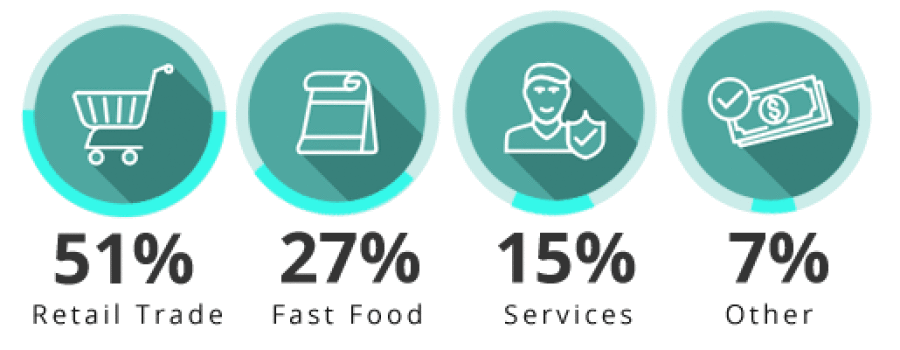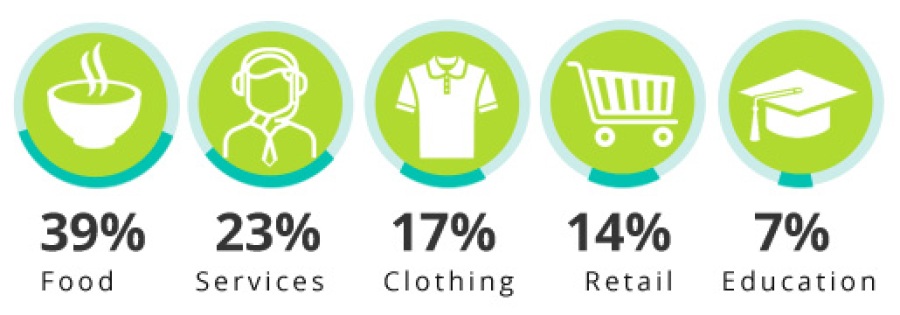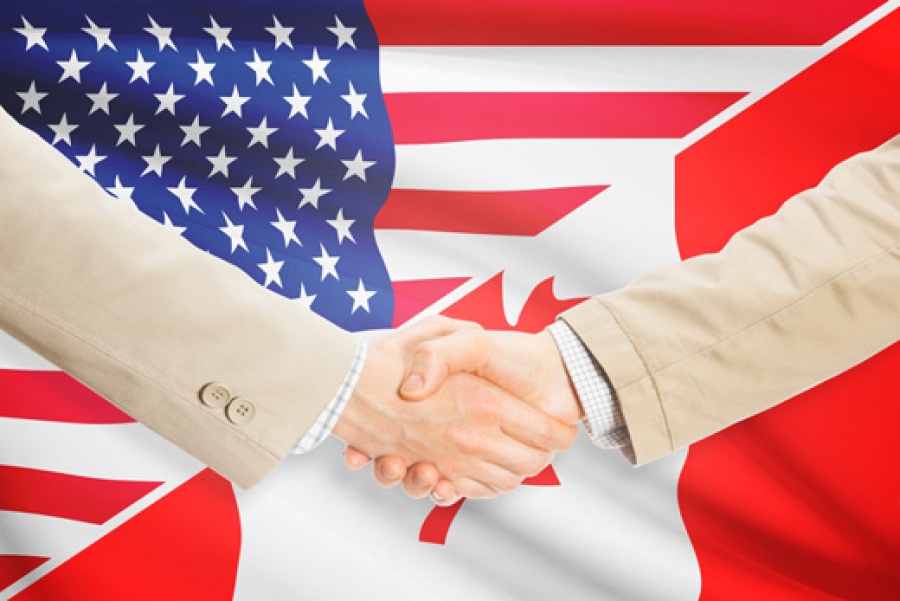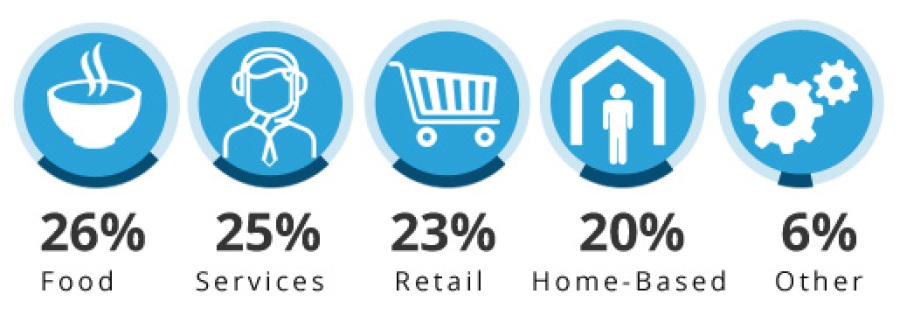
In this final section of the report, we check out 3 international franchise markets that pique the interest of American franchisors for one reason or another.
Russia Continues to Intrigue
Over the past few years, Russia has been intriguing Americans for a myriad of reasons – mostly political. However, because of its sheer size, Russia has long been of interest to American franchisors curious if their products and services can find a viable market in the country that spans two continents: Europe and Asia (it should be noted the Asian portion is only home to about 25% of the country’s population despite making up at least 2/3 of the Russian landmass).
Franchising in Russia has been around just over 20 years, starting in the mid-1990s when formal franchise legislation was enacted. According to Export.gov, there are over 7,000 franchising systems in Russia now, about 12% of which are American.

Distribution of Franchises in Russia by Industry (Source: Export.gov)
Traditionally, franchise laws in Russia have notably favored franchisees. But in recent years, rights for both sides have become more balanced. Notable amendments that have been made to Russian franchising law with the last 10 years include, but aren’t limited to:
- Expansion of permissible restrictions under the franchise agreements, including but limited to, a franchisor’s use of intellectual property and pricing provisions.
- Curtailing provisions of a franchisee’s right to conclude a franchise agreement for a new term.
- Establishment of new provisions for one-sided (unilateral) early termination of a franchise agreement.
For franchise agreements to be valid in Russia they – along with any trademarks to be licensed – must be registered with the Federal Service for Intellectual Property, Patents and Trademarks (also known as Rospatent) with Russia designated as the registrant country. As with expanding into any new country, franchisors should get counsel from experts in the fields of legal, real estate and tax issues specific to Russia.
Currently, franchisors considering Russia should take heed. According to the latest EGS GlobalVue (an annually-updated ranking system by Edwards Global Services for gauging franchise potential), Russia ranks in the second tier of three. Factors drawing the most concern are the country’s sluggish projected GDP growth for 2017 along with the state of its political and economic stability.
Chile Emerges as a Hot Franchise Destination
In the earlier referenced EGS GlobalVue ranking system for franchise potential, the U.S. has the best cumulative score for franchise market potential. The second best score? Chile.
Within this relatively small country, its population is about 3 million less than that of New York State, there are over 200 franchise brands operating currently. About 82% of those brands are from Chile, United States, Spain, Peru, and Argentina per the Universidad de Chile Business School. These brands fall along the industry distribution illustrated in the chart below.

Distribution of Franchises in Chile by Industry (Source: Universidad de Chile Business School)
In general, Chile holds a reputation for being South America’s most stable and transparent commercial environment. Chile is also receptive to foreign investment, already having preferential trade agreements with 54 countries.
There isn’t franchise specific legislation in Chile, however. Franchises, like non-franchised businesses are subject to local trade laws. Incoming franchisors are encouraged to register their trademarks before entering the country. Franchisors don’t need to register with any professional or regulatory body before setting up a franchise system in Chile.
When considering Chile as an expansion option, franchisors should note the nature of the Chilean business culture is very risk adverse. Potential franchisees may need extra reassurance in a franchisor’s brand before they are willing to make a large, upfront investment. Relatedly, according to the Santiago Chamber of Commerce, franchises with low initial investments (around $100,000 to $200,000) fare better than those franchises requiring a higher initial investment. Some of this cautiousness is attributed to a recent economic slowdown in the country.
Canada Still Flourishing as a Franchise Destination for U.S. Franchises
For U.S. franchises that want to go international, often the first look is towards its neighbor to the north. For several of the franchises in the Top 100 that only operate in two countries, those two countries are virtually always the U.S. and Canada.
| Top 100 Countries That Operate in Two Countries: the U.S. and Canada | ||||
| Franchise | Rank | |||
|---|---|---|---|---|
| Liberty Tax | 28 | |||
| Great Clips | 38 | |||
| Vanguard Cleaning Systems | 42 | |||
| The UPS Store | 48 | |||
| Sports Clips | 50 | |||
| Stratus Building Solutions | 63 | |||
| Panera | 72 | |||
| Merry Maids | 88 | |||
| Servpro | 96 | |||
| Property Management Inc. | 99 |
For good reason too. Canada is not only close as it can be to the U.S. in proximity, the countries also share many cultural elements and a language (except for the province of Quebec where French is the official language, but English is still widely used there as well). Not to mention, the U.S. dollar stretches well in Canada.
Larry Weinberg, who specializes in franchise law and chairs the Legal & Legislative Affairs Committee at the Canadian Franchise Association, believes Canada is the No. 1 destination for U.S. brands. “We are not really full-blown international to them,” he says. “We’re a simpler place to go.”
The biggest place that simplicity doesn’t extend to is Canada’s franchise regulatory environment. “It’s unusual. As far as I know, Canada is the only country in the world where part of the country has a franchise law and part of it doesn’t,” Weinberg says.
Six of 10 Canadian provinces have franchise-specific legislation with the British Columbia Franchise Regulation Act being the most recent addition. The Canadian Franchise Association does its best to foster transparency between franchisors and prospective franchisees by requiring members to produce a disclosure document, but that doesn’t cover all the franchises in Canada.

However, the lack of uniformity in franchise laws across the country hasn’t been a deterrent to franchise expansion in Canada. “I have clients from all over the world who see Canada as a wonderful, politically, financially, culturally stable jurisdiction to develop their markets,” says Stéphane Teasdale, chairman of the international law firm’s global franchise and distribution law group at Dentons Canada LLP (she also serves as co-head of the corporate and commercial law group). “[Clients] see Canada as being a relatively easy and not so expensive place to do business, with 30-million-plus people to buy their goods and services.”
The numbers back up her claim. According to the Canadian Franchise Association, there are approximately 1,300 franchise brands operating in Canada generating about $68 billion each year. Here are a few more quick facts on the market:
- There are over 78,000 franchise units across Canada.
- About 1 of every 14 working Canadians are employed by the franchise industry directly or indirectly.
- 62% of prospective Canadian franchisees have a college degree.
Per a survey, the top industries in which prospective Canadian franchisees are looking for an opportunity include:















